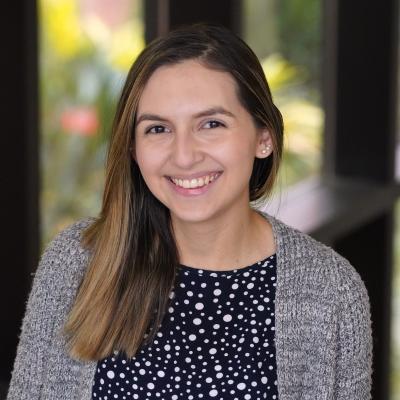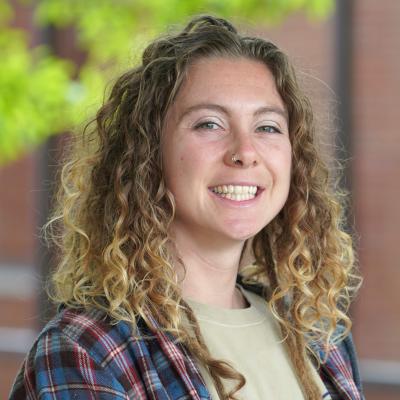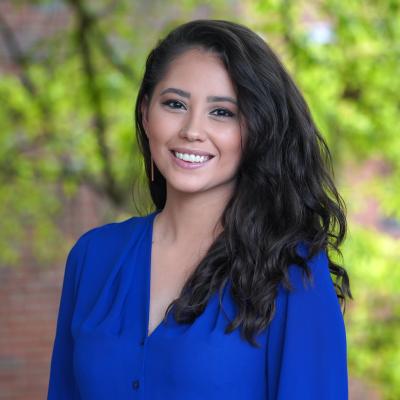
DOCTORAL, SPECIALIST AND MASTER’S IN ENGLISH EDUCATION
Highly qualified graduate students finish the Curriculum & Instruction: English Education program prepared to meet the demands of teaching in the 21st century. Whether you earn a doctorate, specialist or master’s in English Education, you’ll go on to flourish in classrooms and beyond.
As part of your advanced course work, you will have numerous opportunities to work with adolescents and their teachers. You’ll gain experience in local schools, tutor individual at-risk students, teach small groups, and plan and present lessons. As you practice planning, delivering, and managing high quality instruction, you’ll gain a rich understanding of the many print and non-print literacies that define today’s communication. For instance, you will understand and address how technology can enhance teaching and learning.
We also explore the roles English teachers assume when working with English Language Learners (ELLs). Another area of study in the program looks at the English teacher’s role in reading instruction.
We offer an online master’s in Curriculum & Instruction with a concentration in English Education designed for those who already hold a Professional Educator’s Certificate. We also offer on-campus master’s and doctoral degrees.
Please note: These are advanced programs designed for current teachers. If you are seeking teacher certification for English Education (grades 6-12), please see our English Education combined BS/MS pathway.
In order to meet minimum University admission requirements, applicants must have:
- A bachelor’s degree with at least a 3.0 GPA – An earned bachelor’s degree from a regionally accredited U.S. institution, or a comparable degree from an international institution, with a minimum 3.0 (on a 4.0 scale) grade point average (GPA) in all coursework attempted while registered as an upper-division undergraduate student working towards a bachelor’s degree.
- GRE test scores*. Official test results are required from the General Test of the Graduate Record Examination (GRE). These scores are considered official only when they are sent directly to the Office of Admissions from the testing agency. Examinee copies are not considered official. Graduate Record Exam (GRE): http://www.ets.org/ – FSU Institution Code: 5219. The Educational Testing Service (ETS) do not retain scores longer than five years. If your test scores are older than five years, you may have to retake the test to have official scores sent directly to FSU from the testing agency. If you have the report that was mailed to your home address for older scores, then FSU will accept that report.
- M.S. and Ed.S. applicant target scores: Verbal – 146+, Quantitative – 140+
- Ph.D. applicant target scores: Verbal – 151+, Quantitative – 145+, Writing – 3+
- *NOTE: The GRE admission requirements for master's and specialist programs have been waived through Fall 2026.
- Language proficiency test (international students only)– FSU accepts scores from TOEFL (minimum 80), IELTS (minimum 6.5), MELAB (minimum 77), Cambridge C1 Advanced Level (minimum 180), Michigan Language Assessment (minimum 55), and Duolingo (minimum 120)
- Transcripts – Applicants must submit an official transcript from each college and/or university attended. Transcripts should be sent to the Office of Graduate Admissions electronically at graduateadmissions@fsu.edu or via mail in a sealed envelope:
- Florida State University
Office of Graduate Admissions
314 Westcott Building
P.O. Box 3061410
Tallahassee, FL 32306-1410 - Admission to graduate study is a two-fold evaluation process. The Office of Admissions determines eligibility for admission to the University, and the academic department, program, or college determines admissibility to the degree program. University graduate admissions requirements are found at https://gradschool.fsu.edu/admissions/graduate-admissions. Academic programs have additional requirements.
- Florida State University requires a course-by-course credential evaluation for all applicants that have degrees from a non-U.S. institution. International and domestic applicants with degrees earned from international institutions must submit their official transcripts through a NACES approved evaluator for transcripts from a non-U.S. institution. SpanTran has created a custom application for Florida State University that will make sure you select the right kind of evaluation at a discounted rate. See the “Transcript Requirement” section on The Graduate School website, https://gradschool.fsu.edu/admissions/graduate-admissions, for detailed information on University transcript requirements for graduate admission.
- Florida State University
Applicants must upload the following REQUIRED supporting documents to the Admissions Application Portal:
- Statement of purpose – should describe your purpose for pursuing a degree, qualifications and long-term career goals.
- At least one (1) page for M.S. and Ed.S. applicants
- At least two (2) pages for Ph.D. applicants
- Letters of recommendation
- Two (2) for M.S. and Ed.S. applicants
- Three (3) for Ph.D. applicants
- One page resume/curriculum vitae
- Writing Sample – it is acceptable to submit a paper used in another class, or one that was published.
Master’s and Specialist programs:
Fall: July 1
Spring: November 1
Summer: March 1
Doctoral program:
Fall: December 1 (priority deadline); July 1 (final deadline)
If you are interested in applying, please contact STE-GradCoord@fsu.edu.
Curriculum choices in our master’s and specialist programs are designed to enable students to become teacher leaders, college instructors, as well as curriculum specialists, state testing specialists and textbook company representatives. Doctoral program graduates are prepared to become university professors, researchers and leaders in the field.
According to the U.S. Bureau of Labor Statistics, job outlook for high school teachers is expected to grow 7.5% through 2026, which equates to approximately 79,500 new jobs. The job outlook for instructional leaders/coordinators is expected to grow up to 10.5% through 2026. That translates into over 17,000 new jobs nationwide. The median national annual salary range for instructional leaders/coordinators is $64,450 per year. For university or college professors, the Bureau predicts a 9.8% increase in jobs by 2026, totaling 8,300 new jobs. The median national salary is $66,590 per year.
A career in education can be very rewarding, and a typical path offers ample opportunities for professional development and growth. Educators make a difference in the lifelong learning experience of their students, as well as, the quality and standards of the programs they teach.
Click here to learn more about our English Education faculty!

Hometown: Valencia, Venezuela
Degrees: English Education (B.S. '20), Curriculum & Instruction (M.S. '21)
Current Position: 7th Grade ELA/CT teacher at Riversprings Middle School, Crawfordville, FL
"My time in the English Ed program was truly a gift. For over three years, I had the ability to learn and grow from not only the amazing faculty at Florida State but also from my incredible peers. The College of Education taught me that there's more to teaching than just grading papers and assigning homework. The mindset is to constantly adapt and evolve to the new ways of changes in the educational field, embrace diverse research, cherish student interactions, and better the field with enthusiasm and passion. I will look at those years with nothing but fondness, clinging to them during the difficult times, and reaching for them when facing new challenges. My hope is to in the future, be able to give back to the College of Education at least a fraction of what they gave me."

Hometown: Fort Lauderdale, FL
Degrees: English Education (B.S. '19), Curriculum & Instruction (M.S. '20)
Current Position: 9th grade Pre-AP English teacher, Pompano Beach High School, Pompano Beach FL
Publication/Conference Presentation(s): Invisible Diversity: ELA Teaching with Students from Non-traditional Homes, NCTE 2019
"The community. Over time, we all bonded so much and created relationships that can't be mirrored. We came together over shared confusion, passion for education, and a genuine love for our future paths. My cohort specifically was made of people of such different interests and backgrounds outside the program, but we quickly became knitted like a family. The program itself was very thorough and prepared me well. I was challenged and grew daily; I was pushed beyond my comfort zones in research, content development, and classroom hours which all made me a better educator. Here, I fostered my love for education even more and I have the blessing to share that with my students every day."

Hometown: Rockledge, Florida
Degrees: English Education (B.S. '20), Curriculum and Instruction (M.S. '21)
Current Position: 8th grade ELA teacher, Montford Middle School in Tallahassee, FL
"The English Education program at Florida State was and continues to be one full of professionals who care deeply about their craft and the students they work to develop into teachers. The training and education I received while enrolled at Florida State rivals that of any organization I have been a part of, to include my time in the military. I still receive support from my professors and know I have an institution at the ready to back me even after graduation."

When I started the doctoral program, I was interested in multicultural education, the professional preparation of critical literacy teacher educators, the positive cultural identity formation of African American students, and the achievement and opportunity gaps. I was concerned that as an African American woman attending a predominantly white institution, I might not get the opportunity to learn about or conduct research on racial or multicultural topics. My instructors and advisors, however, supported me in my research interests by allowing me to cater my course assignments, direct individualized studies, and dissertation research to my research focus. As a graduate teaching assistant, I helped redesign and develop the curriculum for the Applied English Linguistics for Teachers course by expanding the raciolinguistic components. As a graduate research assistant, I co-designed and conducted a pilot study about an African American young man’s perceptions about reading and literacy experiences after graduating from an alternative high school.
My future professional goals include teaching preservice English teachers and developing ways for nonprofit, community-based programs to better support public schools with afterschool and mentoring programs (which was the catalyst for my desire to return to school). I also would like to develop an English/Language Arts curriculum to foster racial literacies and cultural competence.

This program has been amazing. The instructors and my cohort members have been kind and supportive throughout this entire experience. One of the key things about this program is that you take most of your classes with your cohort members. Seeing these familiar faces day in and day out has allowed me to build a community here at FSU as a transfer student that I would not have had the opportunity to be a part of otherwise. I feel confident that this program has allowed me to build a network of people that I can continue to be supported by throughout my career and look to them for guidance when I need it.
My goal when I graduate is to move back up north and live in either Baltimore or Philadelphia to work in a lower socio-economic school. My goal with teaching is to be a part of equipping the younger generation with the tools they need to grow in their full potential as individuals. The ultimate dream (meaning if I could have life anyway I want it) in my teaching career, I would eventually like to study how varying of education systems work around the world and apply that to starting a school in South Sudan, where 70% of the children are currently not getting an education.

Current position: 10th grade ELA teacher at Gadsden County High School in Havana, FL
The act of learning and being educated is powerful because it allows one to pass knowledge to others, incorporating both educational milestones and real-life lessons. Whether it is through interactions, the building of relationships with faculty and peers, or within learning communities alongside other educators, FSU’s College of Education encourages authentic learning experiences. Within the FSU English Education MS program, I have been afforded the opportunity to meet a plethora of incredible people, gain valuable knowledge and skills, and feel confident in my ability to educate the leaders of tomorrow.
Publications/Conference Presentations:
- Plummer Catena, E., & Valencia Rhymer, K. (submitted). Participatory cultures, professional development, and classroom practices: ‘Zooming’ in and across contexts. Journal of Adult and Adolescent Literacy. Manuscript submitted for publication, 33 pages.
- Plummer Catena, E., & Valencia Rhymer, K. (presented 2022, March). (Re)considering participatory cultures for and with practicing teachers. Paper to be presented at Conference on College Composition and Communication (CCCC) Annual Meeting, CCCC, Virtual. (International)
- Plummer Catena, E. (presented 2021, December). (Re)considering participatory cultures for and with practicing teachers. Paper presented at Literacy Research Association (LRA) Annual Meeting, NCTE, Atlanta, GA (hybrid). (International)
- Plummer Catena, E., & Valencia Rhymer, K. (presented 2021, November). (Re)considering participatory cultures for and with practicing teachers. Paper presented at Florida Educational Research Association Annual Meeting, FERA, Tampa, FL. (Regional)


